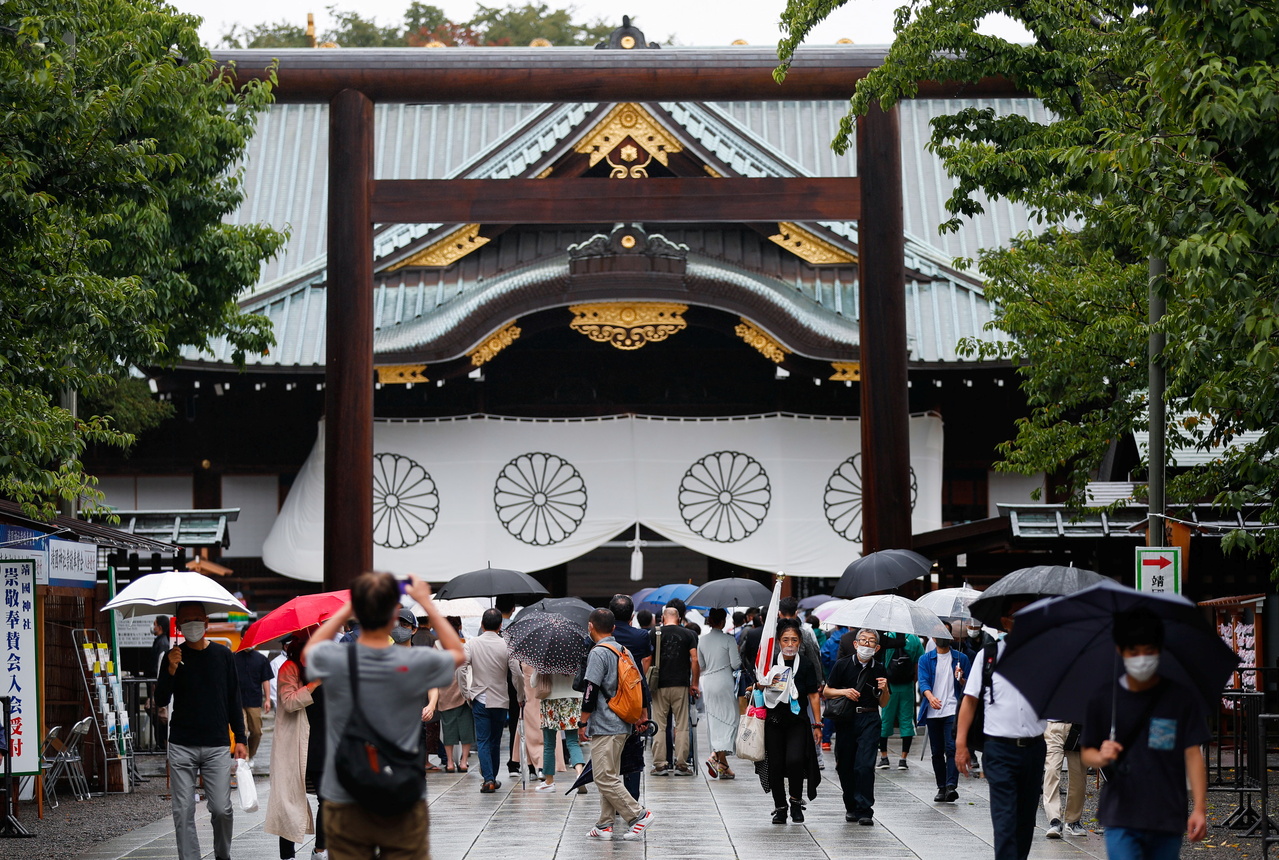Japan PM Suga pledges not to wage war again as ministers visit controversial shrine
Sign up now: Get insights on Asia's fast-moving developments

People visiting Yasukuni Shrine in Tokyo, Japan, on Aug 15, 2021. It honours the war dead, including World War II criminals.
PHOTO: REUTERS
Follow topic:
TOKYO (REUTERS) - Japanese Prime Minister Yoshihide Suga pledged on Sunday (Aug 15) that the country would not wage war again, making the vow on the anniversary of the end of World War II as members of his Cabinet visited a controversial shrine.
Nearly eight decades since the end of the war, the conflict remains a source of tension between Japan and its neighbours, particularly China, North Korea and South Korea.
"Since the end of the war, Japan has consistently walked the path of a country that values peace," Mr Suga said in a speech at a memorial ceremony in Tokyo. "We must never again repeat the devastation of war. We will continue to remain committed to this conviction."
His comments were little changed from those of his predecessor, Mr Shinzo Abe, at last year's ceremony, and were echoed by Emperor Naruhito, who expressed deep remorse for Japan's wartime past, as he has previously done.
Yet, visits to the controversial Yasukuni Shrine by members of Mr Suga's Cabinet as well as Mr Abe on Sunday are likely to anger China and both Koreas.
Mr Abe visited Yasukuni as prime minister in 2013, sparking outrage from Beijing and Seoul and an expression of disappointment from the United States. He did not go again as prime minister, sending ritual offerings instead.
After visiting on Sunday, the former prime minister, who is still a Member of Parliament, told reporters he paid his respect to the souls of the war dead.
On Sunday, the shrine saw a constant stream of visitors from early morning, including families with children and people in military uniform, despite persistent rain and the recent spike in coronavirus cases.
Environmental Minister Shinjiro Koizumi and Education Minister Koichi Hagiuda both paid their respects. Mr Suga is not expected to visit, although he did send a ritual offering through his secretary, the Sankei newspaper said.
Yasukuni honours the war dead, including 14 World War II leaders convicted as "Class A" war criminals, making it a flashpoint for tension.
Koreans still chafe over Japanese rule from 1910 to 1945, while the Chinese have bitter memories of Japan's invasion and brutal occupation of parts of China from 1931 to 1945.
Mr Hagiuda told reporters: "Like any other year, I sincerely offered my heartfelt condolences to those who sacrificed their lives in the previous war and renewed my pledge for everlasting peace."
When asked about the opposition from South Korea and China to visits by ministers, he said it was natural to pay respects to those who sacrificed themselves for their country, adding that he hoped for understanding from Japan's neighbours.
Seoul open to dialogue
South Korean President Moon Jae-in said on Sunday that his government remained open to dialogue with Japan to step up cooperation while seeking to resolve historical rows that had long frayed bilateral ties.
Mr Moon, in his Liberation Day speech marking the 76th anniversary of independence from Japan's 1910-1945 colonial rule after World War II, said the two neighbours should work together to surmount difficulties and foster cooperation based on shared values of democracy and market economy.
"Our government has always kept the door open for dialogue to jointly respond not only to our two countries' pending issues, but also threats facing the world, including Covid-19 and the climate crisis," Mr Moon said.
"For historical issues that need to be rectified, we will resolve them through actions and practices that are consistent with universal values and the standards of the international community."
Relations have soured to their lowest points in decades in recent years, over reminders of the colonisation, after South Korean courts ordered Tokyo to compensate victims who were forced to work for Japanese companies and at its wartime military brothels.
The rulings drew a rebuke from Tokyo, which says the issues were settled under a 1965 treaty that normalised diplomatic relations and other arrangements made later.
Mr Moon's speech came two days after Japan's Defence Minister Nobuo Kishi visited Yasukuni Shrine.
Last month, Mr Moon scrapped a plan to visit Tokyo for the Olympics and hold his first summit with Mr Suga, after what his office called unacceptable remarks by a Seoul-based Japanese diplomat.
Mr Moon had expressed hopes that the Games could be a chance to seek a diplomatic solution to the historical feuds and promote joint economic recovery with Japan from the coronavirus pandemic while reviving stalled talks with North Korea.

